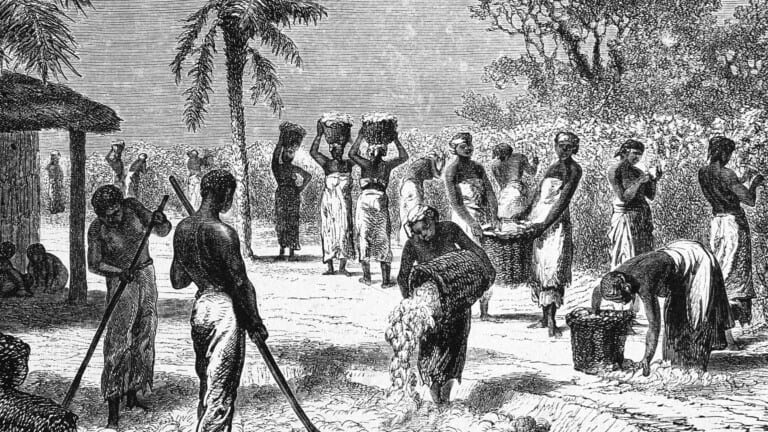Introduction
In the late 18th century, the American Constitution accepted the existence of slavery. It was considered an institution: there have always been slaves since the 18th century.
They chose black slaves instead of Indians because of the trial of Valladolid, where people wondered if the Native was a man or simply an animal. It turned out to be a theological problem: if the Native did not have a soul then he was an animal.
In the end, they declared that Natives had a soul and this “discovery” caused an economic shock: the Natives could not be employed anymore in plantations and ships started bringing in African slaves.
Slavery
Towards the end of the 18th century, people thought slavery would naturally die out. They were very naive.
Unfortunately, Whitney invented the Cotton Gin and put an end to those naive considerations.
Rather than declining, the number of slaves increased in the South: in 1820, there were 1,500,000 slaves in America. There were 4,000,000 in 1860.
Slavery was an economic problem for 75% of the cotton crops were exported, representing 60% of America”s foreign earnings. Slavery was hence very profitable to the South and – by way of consequence – to the whole continent.
Everybody sees the discrepancy between that democratic system and the harsh realities of slavery, which was a potentially explosive issue. Several stages in the explosion:
- 1800: the slave Gabriel Prosser led an insurrection with 1,000 slaves in Virginia. He was executed, as well as 35 other people.
- 1822: the authorities discovered plans for slave insurrection in South Carolina with slave Vesey trying to launch a slave insurrection.
- 1819-1822: the “black years” following the Missouri Compromise, a 2-year struggle between North and South. After this, there will be free states and slave states.
After 1820, the USA was divided between free states and pro-slavery states. The balance is impossible. In Louisiana, slavery is allowed in the South but prohibited in the North: the controversy gets tougher and tougher and violence slowly but surely rises.
That situation turned about sectionalism (from Latin sectus: cut) and there were more and more slave insurrections.
David Walker, a free black, published Appeal to the Coloured Citizens, urging slaves to rebel/revolt in 1830. His motto was “Kill or be killed !”.
In 1831, there was an insurrection led by Nat Turner in Virginia. Sixty whites were killed.
David Walker
He was the son of a free slave and moved to Boston in 1829 to sell old clothes. He published a pamphlet and, over the night, his book was a success.
It infuriated Southern landowners and Georgia offered a reward of $10,000 for anyone who would deliver Walker alive and $1,000 to kill him. By the summer of 1830, Walker was dead.
His point was mainly historical: there was no slavery in history. All the examples he took belonged to his biblical culture, his background being essentially religious (religion was then a shelter for slaves).
Synopsis » From the Puritan settlements to the American Civil War (1787-1877)
- Antebellum South
- Introduction to Puritanism and Expansionism
- Life in the Plantations
- USA: North and South
- O’Sullivan’s Manifest Destiny
- The social context of America in the early 19th century
- The American Civil War: 1861-1865
- America: The New Nation
- After the American Civil War: The Reconstruction
- America: West to the Pacific
- Years of Growth



